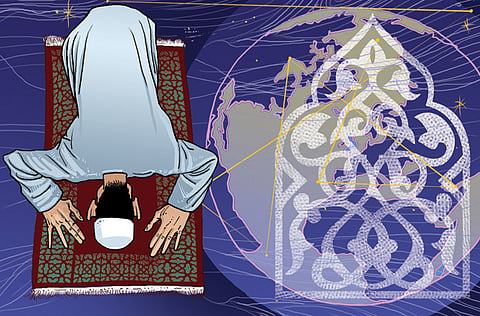A resonance of universal values
Ramadan engenders Muslims to cultivate within themselves the core values

Growing up, I had many misconceptions about Ramadan. To me, it was simply about starvation and deprivation. I did not understand that this momentous month is incredibly special and a deeply spiritual time for Muslims all over the world. My idiosyncratic quest for spirituality began when I was in my teens. I wanted God present in my life and not just as a remote shadow.
With all my myths demystified, I now look forward to Ramadan because there are a myriad lessons that Muslims and non-Muslims alike can learn from it.
Prophet Mohammad (PBUH) said the most beloved person to God is the one with the best manners. Ramadan is a time when Muslims strive to exhibit increased morality and profound magnanimity and this brings together people of all faiths and cultures. Morality at an individual level is about embracing justice, compassion and tolerance towards all people. At a communal level, it is about being a responsible citizen and making a positive contribution to society. These precepts are inherent to Islam, but also resonate with universal values.
The Quran states that the ultimate purpose of the fast is to ‘attain piety’. The Arabic word for fasting, ‘sawm’ literally means ‘restraint and self-control’. Abstinence from fulfilling the physical desires is a catalyst for self-discipline and it is through this that a Muslim practises noble manners and good speech. Ramadan is a time of spiritual reflection; Muslims are required to filter out bad habits that have become part of their characters over time. Research shows that habits are usually formed in about 21 days. Aristotle said: “We are what we repeatedly do.”
In addition, Muslims dedicate themselves to the worship of God and seek His forgiveness. Fasting also inculcates the qualities of empathy and compassion towards those who are less fortunate than ourselves and who may be suffering because of poverty, famine and inequality. For example, when a fasting person feels the pangs of hunger and thirst, this evokes a sense of fraternity, solidarity and social responsibility because it encourages Muslims to be charitable. At the same time, it reminds them of a core principle of Islam: Treat others the way you yourself wish to be treated.
During Ramadan, Muslims reflect upon and appreciate the blessings they have in life; basic necessities like food and water that are sometimes taken for granted. As writer Cynthia Ozick said: “We often take for granted the very things that most deserve our gratitude.”
The spirit of Ramadan is about being gracious. Nevertheless, there seems to be a demise in graciousness across the world and this is plaguing religious and non-religious societies alike. The important characteristics of tolerance and selflessness are scarce. This is perhaps a consequence of the rampaging materialism that may have taken over our lives, compelling us to succumb to the desires of our soul, plunging us into a state of spiritual deprivation. Ramadan teaches Muslims to be more conscientious towards others. Muslims are not only required to curb their appetite, but also refine their character by taming the soul and purifying it from diseases and traits such as arrogance, selfishness, dishonesty and intolerance.
Islam is inclusive in dealing with the human being. There is profound emphasis on the soul because it governs the actions of the body. A scholar once said: “The heart is the king of the limbs and the rest of the limbs are its soldiers. If the king is righteous, the soldiers will also be righteous. Similarly, if the king is corrupt, his soldiers will also be corrupt.” Ancient philosophers also believed that the mind, body, heart and spirit should work in harmony. In addition, Plato is credited with saying “... the part can never be well unless the whole is well”.
In our post-modern societies, we sometimes lose the spirit of building positive relationships with people. We tend to be oblivious to the fact that everything we do has an impact on others — while we have freedom, this comes with responsibilities. Ramadan, thus, reminds us of the significance of sacrifice and putting others before oneself.
In the 21st Century, Islam is portrayed as the “other”, a way of life that is embroiled in a lethal clash of civilisations and incompatible with universal values. For example, in Britain, the recent furore around the “Trojan Horse” controversy was sparked by allegations that a form of “extremist Islam” was permeating in some of the state-funded schools and creating a culture of separatism. This prompted the British government to announce that schools in the United Kingdom must promote British values such as respect for the law, democracy, equality between genders and tolerance of different faiths and beliefs. While these mores are virtuous, they are not exclusively British. They are also paramount in Islam and every year, Ramadan engenders Muslims to cultivate within themselves these core values. And they should be invariably articulated and upheld at all times and towards all people.
Saara Khan is a British writer and a doctorate candidate, researching the relevance of Islam in contemporary society.


